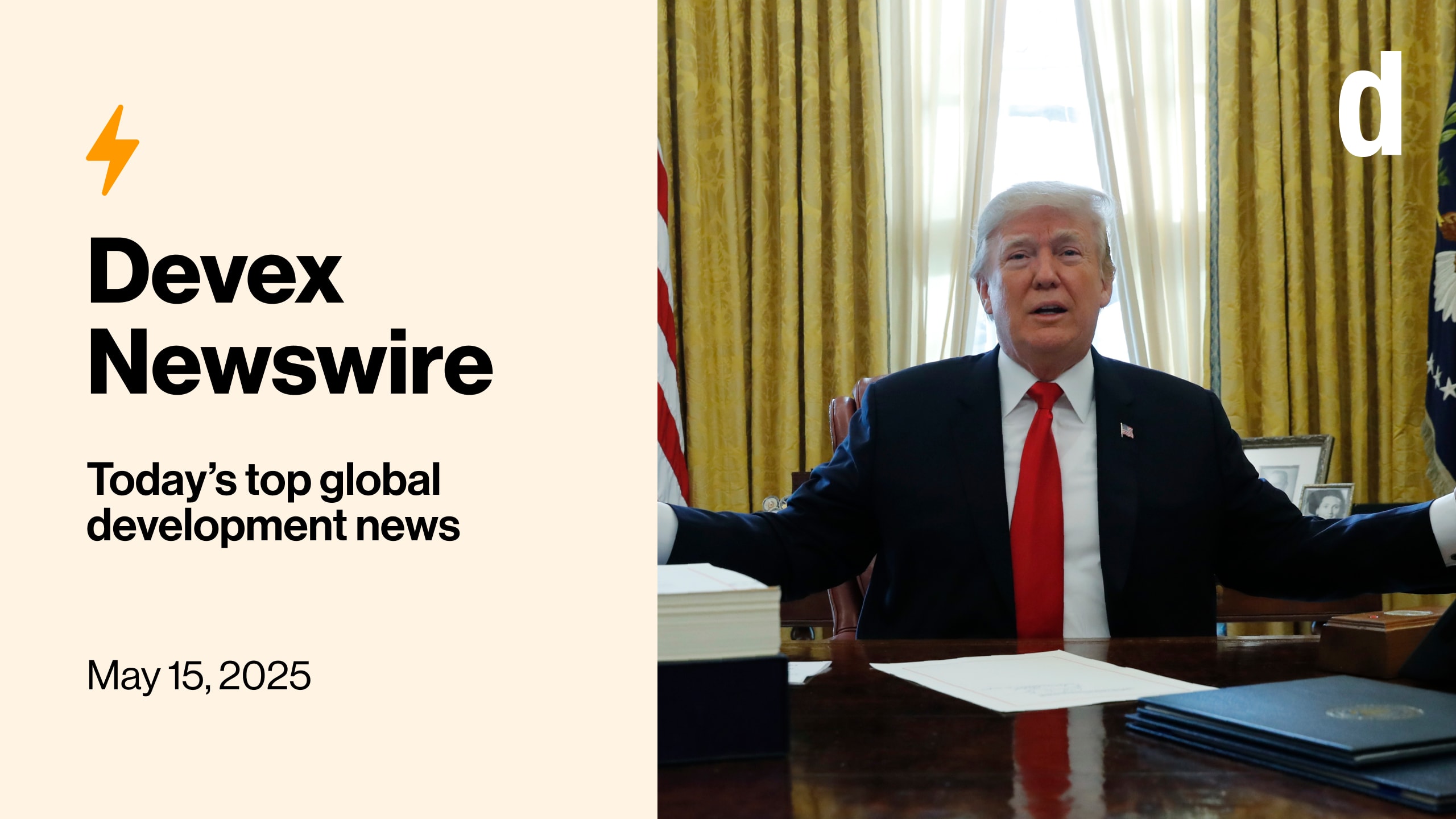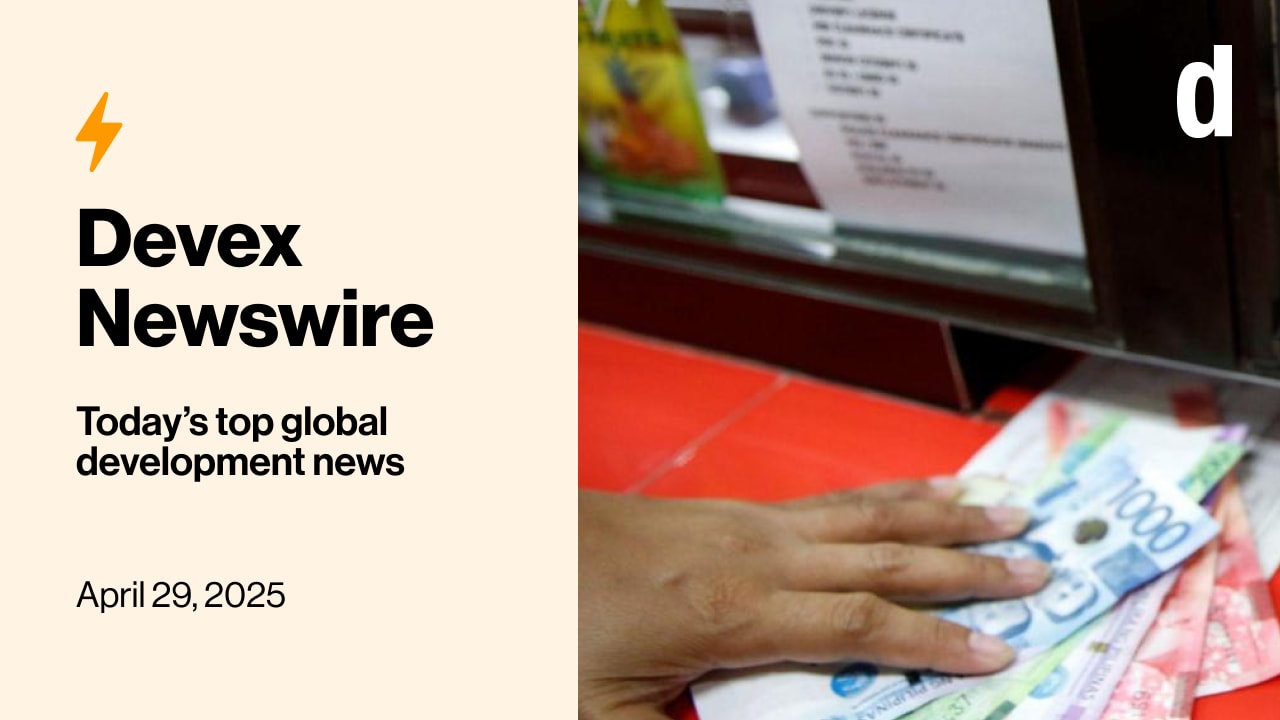
U.S. President Donald Trump’s “big, beautiful bill” — do we even need the quotations around that any more? — passed the House of Representatives. But what nonprofits considered a poison pill didn’t pass along with it.
Also in today’s edition: A major development bank will have to elect a new leader who can maintain the bank’s impressive growth while navigating today’s era of dwindling aid.
This is a preview of Newswire
Sign up to this newsletter for an inside look at the biggest stories in global development, in your inbox daily.
+ Happening today: In the wake of the massive layoff of development workers due to the aid cuts, some are considering pivoting to consulting. To help aspiring and current consultants navigate an increasingly saturated job market, today at 9 a.m. ET (3 p.m. CET), we’ll be joined by a veteran development consultant and a social impact coach to offer practical insights. You can still register here.
Warning label
Supporting terrorism is an explosive accusation that can instantly sink your reputation. That’s why nonprofits were up in arms when Republicans inserted a clause — dubbed the “nonprofit killer” — that allowed the Treasury secretary to slap a terrorist-supporting label on organizations without due process.
While it is already illegal for nonprofit groups to support terrorism, the bill would have made it easier for the executive branch to label organizations as doing so, and thus strip them of their tax-exempt status, my colleague Elissa Miolene writes. Then, the legal onus is on those nonprofits to prove their innocence — not the other way around.
“It would take time and resources, and there would be all sorts of consequences you’d face just from the accusation,” says Kia Hamadanchy of the American Civil Liberties Union. “That’s going to be really devastating for a lot of organizations, and that's why the lack of due process is such a big concern here.”
Despite the sigh of relief, it’s too soon for nonprofits to declare victory.
“It’s our expectation that we’re going to have to keep beating this back in the future, and we’ll be ready for that,” Hamadanchy says.
Read: Trump's signature tax proposal passes without ‘nonprofit killer’ clause
Background: Trump’s ‘big, beautiful bill’ clears key committee, hurting foundations
A disaster waiting to happen?
The U.S. State Department office that handles refugee issues is absorbing the disaster response work that USAID’s Bureau for Humanitarian Affairs, or BHA, was once known for, prompting questions over whether the State Department’s Bureau of Population, Refugees, and Migration, or PRM, has the capacity and skills to handle such an enormous new responsibility. Those concerns are compounded by the fact that PRM is less than 10% the size of BHA.
“The goals, characteristics, and types of assistance provided in response to humanitarian emergencies remain the same,” reads an internal cable, obtained by Devex. “Assistance will continue to be delivered consistent with U.S. foreign policy priorities under the America First agenda.”
But not everyone’s convinced the bureau’s up for the challenge.
“PRM does important work, including refugee and migration diplomacy,” says Rob Jenkins, who served as assistant to the administrator at USAID’s Bureau for Conflict Prevention and Stabilization during the Biden administration. “But they write checks to UN agencies and [the International Committee of the Red Cross]. They don’t deploy to emergencies. And aren’t built for it.”
Read: State Department refugee office assumes USAID’s disaster response role
Banking on a winning formula
Over the last decade, under the leadership of President Akinwumi Adesina, the African Development Bank grew into a financial heavyhitter, with capital more than tripling to $318 billion and a workforce reaching 2,000 employees. Next week, AfDB will select a new leader who will not only inherit an expanding bottom line, but a new era of tightening aid budgets and ballooning debt.
On May 29 in Abidjan, Côte d’Ivoire, 81 member states — including African nations and major shareholders such as the United States, France, and Saudi Arabia — will cast their votes to pick Adesina’s successor.
The five candidates vying for the top spot include an establishment pick focused on speed and self-reliance, a favorite of Central Africa focused on infrastructure and food, and a Mauritanian economist who wants the bank to be far more assertive in unlocking the continent’s financial potential.
As Zambian economist Samuel Maimbo, a candidate who spent over two decades at the World Bank, warns: “If you're running on aid and debts, and your debt is not being resolved, and your aid is disappearing, there is no other way but down for the continent.”
My colleague Ayenat Mersie profiles Maimbo plus the other four candidates — Amadou Hott, Bajabulile “Swazi” Tshabalala, Sidi Ould Tah, and Abbas Mahamat Tolli — in her must-read preelection primer.
Read: Inside the race to lead the African Development Bank
+ Ayenat will be in Abidjan next week for the AfDB election, if you’d like to get in touch, send her an email at ayenat.mersie@devex.com.
Risky biases
Three of those AfDB candidates penned an opinion piece for Devex in which they argue that “African nations are being punished by a global financial system that systematically overprices the risk of investing in their economies.”
“The result: Governments are paying up to five times more to borrow from capital markets than they would through concessional financing,” write Hott, Maimbo, and Ould Tah.
They point to the South African presidency of the Group of 20 major economies, a first for an African country, as “a singular opportunity to rewrite the rules of engagement — to make the cost of capital a true test of global fairness,” adding: “This isn’t just an African problem — it’s a global liability. The world cannot afford to choke off growth in the very region that holds the key to future labour supply, new markets, and climate resilience.”
Opinion: Africa’s cost of capital crisis is a G20 test of global fairness
+ As the sector looks toward the Financing in Development conference in Spain next month to chart a course for development finance in this new aid landscape, we’ll be hosting a series of events to preview some of the talking points. On May 28, experts Vera Songwe, Homi Kharas, and Rick Samans will join us to explore how multilateral development banks can fill the gaps left by the withdrawal of bilateral aid donors. Save your spot now.
This event is exclusive to Devex Pro members. Not yet gone Pro? We offer a 15-day free trial.
A climate of fear
The subject of climate change has become more politically fraught with Trump’s second presidency. Even the term has become taboo, with some organizations stripping it from their websites for fear of attracting the wrath of the U.S. president.
Has the Asian Development Bank fallen into this preemptive self-censorship trap?
References to climate were conspicuously absent during ADB’s recent annual meetings, despite its longtime branding as “Asia and the Pacific’s climate bank,” writes Alessio Perrone for Devex.
“The silence is loud and clear — in fact, it’s deafening,” Aaron Pedrosa of the Philippine Movement for Climate Justice tells Devex. “It’s not even a mixed signal — it’s a very strong signal.”
The glaring omission of any mentions of climate change echoed what happened at the World Bank’s Spring Meetings in Washington last month.
“If the ADB is now quietly shifting its goals, it might as well scrap its programming altogether,” said Jörn Brömmelhörster, a retired principal climate change specialist at the bank. “One U.S. election shouldn’t rewrite joint international commitments or the ADB’s own strategies. Trump may be gone by 2030, but the climate crisis won’t be.”
Read: Is ADB still Asia and the Pacific’s ‘climate bank’?
WHO gets heated
The Israeli-Palestinian conflict never fails to elicit strong emotions — and accusations. A discussion at the 78th World Health Assembly about health conditions in Gaza was no different, sparking an impassioned debate among members of the World Health Organization.
Israel was in the hot seat as numerous member states accused it of committing war crimes in Gaza, my colleague Jenny Lei Ravelo tells me. But when the Israeli representative argued that “available humanitarian aid in Gaza is misappropriated by Hamas time after time, and this has turned into a thriving industry siphoning resources meant for civilians to fund its terrorist infrastructure and prolong the war,” WHO’s Dr. Mike Ryan set the record straight.
Ryan countered that there's been no diversion of WHO aid in Gaza. Rather, truckloads of medical supplies are ready to deploy, but aren't being allowed in.
Ryan, who's become very vocal on Gaza, also said that hundreds of thousands of Palestinians face the highest risk category in the Integrated Food Security Phase Classification, which indicates famine is imminent. “Do you know what IPC5 means? They will die immediately unless they receive food and assistance. Now there's a statistic for you. Go away and think about that.”
+ Explore our on-the-ground coverage of the World Health Assembly.
In other news
The world lost a record number of forests in 2024, with fires accounting for nearly half of the destruction. [The New York Times]
New Zealand’s overseas budget continues its downward trend, with climate finance commitments slashed from $250 million to $100 million for 2025, drawing criticism from Pacific leaders and aid groups. [RNZ]
A U.S. federal judge ruled that the Trump administration violated a court order by attempting to deport migrants to South Sudan without providing adequate notice. [Reuters]
Sign up to Newswire for an inside look at the biggest stories in global development.








